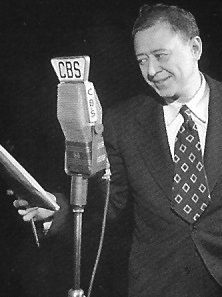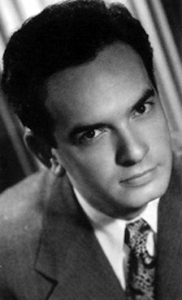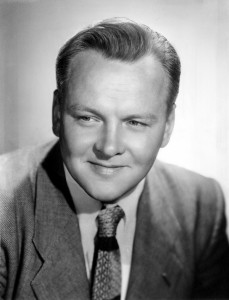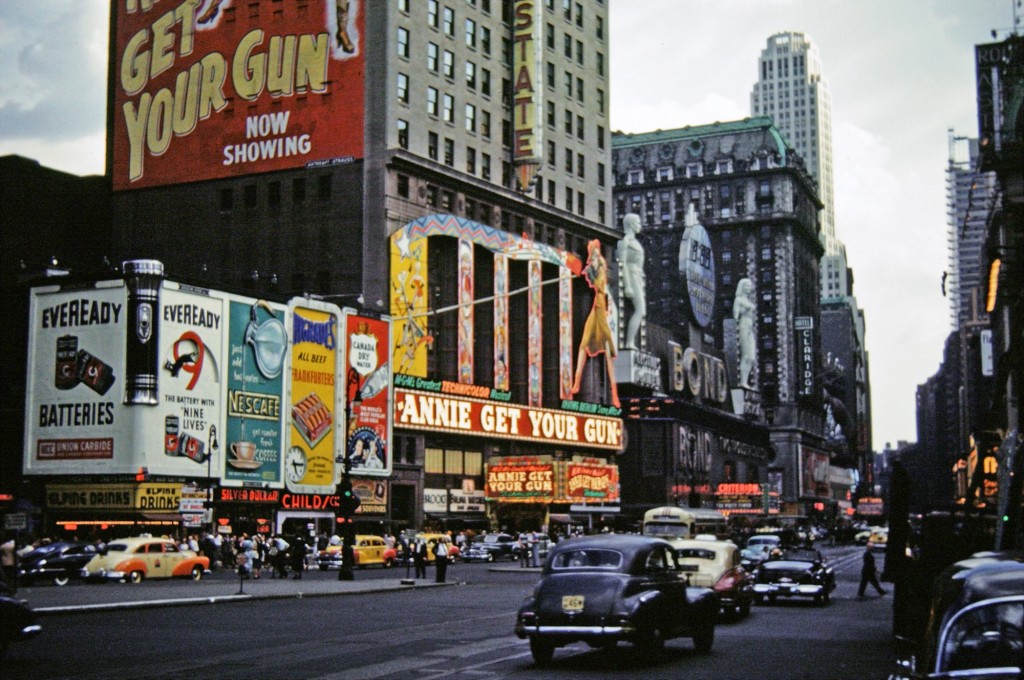“From Times Square to Columbus Circle…the gaudiest, the most violent—the lonesomest mile in the world…”
By the beginning of the 1950s, radio crime drama began to develop a new breed of program that, in the words of old-time radio historian Jim Cox, “witnessed a forbidding side of law enforcement in the harsh realities of an urban backdrop.” Jack Webb’s seminal police procedural Dragnet is considered by many to have been at the forefront of this new kind of cop show…but it’s interesting to note that Dragnet was actually preceded by a few months by a series that premiered over CBS Radio sixty-five years ago today: Broadway’s My Beat.
 Broadway’s My Beat detailed the exploits of plainclothes homicide detective Danny Clover of the N.Y.P.D. According to an early CBS press release: “As a kid, Danny Clover sold papers and shined shoes along the Great White Way, and later pounded the beat as a policeman. He knows everything along Broadway—from panhandler to operatic prima donna—but he’s still sentimental about the street, forever a wonderland of glamour to him.” Stage veteran Anthony Ross played Clover in Broadway’s early run, which originated at the network’s New York Studios for the first four months, with producer Lester Gottlieb and director John Dietz at the helm.
Broadway’s My Beat detailed the exploits of plainclothes homicide detective Danny Clover of the N.Y.P.D. According to an early CBS press release: “As a kid, Danny Clover sold papers and shined shoes along the Great White Way, and later pounded the beat as a policeman. He knows everything along Broadway—from panhandler to operatic prima donna—but he’s still sentimental about the street, forever a wonderland of glamour to him.” Stage veteran Anthony Ross played Clover in Broadway’s early run, which originated at the network’s New York Studios for the first four months, with producer Lester Gottlieb and director John Dietz at the helm.
 Beginning on July 7, 1949, the program moved to the West Coast—where none other than “Mr. Radio” himself, Elliott Lewis, took over Broadway’s My Beat’s direction and production chores. It would be the actor’s first foray into working on the other side of microphone, which he would continue to do with such series as Suspense, On Stage and Crime Classics. Writers Morton Fine and David Friedkin (Bold Venture) handled most of the scripting for the series. Director-producer Lewis was a native Manhattanite, and brought this expertise to the program…particularly in the area of “sound patterns.” Lewis utilized three sound effects men—David Light, Ralph Cummings and Ross Murray—to give him precisely what he wanted: a cacophonous show where “even the people in New York are noisy.” Elliott strongly believed that Manhattan was just as much a character as the regulars in the series. “You should hear the city constantly,” he told the SFX men. The Big Apple was even referenced in Broadway’s memorable theme song, I’ll Take Manhattan. The program’s vibrant musical score was composed by Alexander Courage, who would later write the opening theme for the television classic Star Trek.
Beginning on July 7, 1949, the program moved to the West Coast—where none other than “Mr. Radio” himself, Elliott Lewis, took over Broadway’s My Beat’s direction and production chores. It would be the actor’s first foray into working on the other side of microphone, which he would continue to do with such series as Suspense, On Stage and Crime Classics. Writers Morton Fine and David Friedkin (Bold Venture) handled most of the scripting for the series. Director-producer Lewis was a native Manhattanite, and brought this expertise to the program…particularly in the area of “sound patterns.” Lewis utilized three sound effects men—David Light, Ralph Cummings and Ross Murray—to give him precisely what he wanted: a cacophonous show where “even the people in New York are noisy.” Elliott strongly believed that Manhattan was just as much a character as the regulars in the series. “You should hear the city constantly,” he told the SFX men. The Big Apple was even referenced in Broadway’s memorable theme song, I’ll Take Manhattan. The program’s vibrant musical score was composed by Alexander Courage, who would later write the opening theme for the television classic Star Trek.
 The move of Broadway out west also resulted in a casting change in the main character of Detective Clover; Larry Thor, a CBS staff announcer familiar to both Suspense and Escape audiences, won the role. Two other characters appeared regularly on the show: Sergeant Gino Tartaglia (the show’s comic relief, played by Charles Calvert) and Sergeant Muggavan (played by future Oscar nominee Jack Kruschen). Supporting roles were played by a mixture of OTR veterans and movie/TV actors, including favorites such as Hy Averback, Edgar Barrier, Harry Bartell, Herb Butterfield, Mary Jane Croft, Lawrence Dobkin, Herb Ellis, Betty Lou Gerson, Virginia Gregg, Sheldon Leonard, Cathy Lewis, Eve McVeagh, Barney Phillips, Irene Tedrow and Martha Wentworth.
The move of Broadway out west also resulted in a casting change in the main character of Detective Clover; Larry Thor, a CBS staff announcer familiar to both Suspense and Escape audiences, won the role. Two other characters appeared regularly on the show: Sergeant Gino Tartaglia (the show’s comic relief, played by Charles Calvert) and Sergeant Muggavan (played by future Oscar nominee Jack Kruschen). Supporting roles were played by a mixture of OTR veterans and movie/TV actors, including favorites such as Hy Averback, Edgar Barrier, Harry Bartell, Herb Butterfield, Mary Jane Croft, Lawrence Dobkin, Herb Ellis, Betty Lou Gerson, Virginia Gregg, Sheldon Leonard, Cathy Lewis, Eve McVeagh, Barney Phillips, Irene Tedrow and Martha Wentworth.
 While Broadway’s My Beat covered much of the same territory as the better-known Dragnet—exploring hard-hitting topics foreign to radio drama at that time, like juvenile delinquency and anti-Semitism—it eschewed the crisp, clipped presentation of the Jack Webb program in favor of a more literate approach that sometimes veered toward the flowery. It’s important to remember, however, that both programs paved the way for later radio police dramas like The Line Up and Twenty-First Precinct. During its five-year radio run (from February 27, 1949 to August 1, 1954), Broadway was mostly sustained by the network (though it did have brief sponsorships by Lux Soap and Wrigley Gum) and was a utility series in the same manner as radio’s Escape. It would often be bounced around (at one time it was heard in fifteen different time slots) to fill a cancellation hole in CBS’ schedule or called upon as a summer replacement (for Arthur Godfrey’s Talent Scouts in the summer of 1950 and Meet Corliss Archer in 1951). In fact, there was a time when Broadway and two other Elliott Lewis series, Crime Classics and On Stage, could be heard on the same Sunday night in 1954.
While Broadway’s My Beat covered much of the same territory as the better-known Dragnet—exploring hard-hitting topics foreign to radio drama at that time, like juvenile delinquency and anti-Semitism—it eschewed the crisp, clipped presentation of the Jack Webb program in favor of a more literate approach that sometimes veered toward the flowery. It’s important to remember, however, that both programs paved the way for later radio police dramas like The Line Up and Twenty-First Precinct. During its five-year radio run (from February 27, 1949 to August 1, 1954), Broadway was mostly sustained by the network (though it did have brief sponsorships by Lux Soap and Wrigley Gum) and was a utility series in the same manner as radio’s Escape. It would often be bounced around (at one time it was heard in fifteen different time slots) to fill a cancellation hole in CBS’ schedule or called upon as a summer replacement (for Arthur Godfrey’s Talent Scouts in the summer of 1950 and Meet Corliss Archer in 1951). In fact, there was a time when Broadway and two other Elliott Lewis series, Crime Classics and On Stage, could be heard on the same Sunday night in 1954.
Of the 212 broadcasts that comprised the radio run of Broadway’s My Beat, about half of those have survived. Radio Spirits has some of them available in three wonderful CD sets: the recently released Great White Way, and the earlier Murder and Neon Shoals. In addition, the Police and Thieves: Crime Radio Drama set contains several programs from the series, as well as many of the shows that followed in its wake.



I always enjoyed the purple prose of this show.
So what’s ‘purple’ about it? Suggestive? Me, I prefer the Chicago scene, with Frank Lovejoy. Now that was true noir. Then again, maybe I should order some if these tapes. Regarding Dragnet, the sound effects were great/absurd. What about this, Ivan? And, other than Amos and Andy, were any African Americans allowed onto radio?
I’m going to speculate that Bill means “purple” in the sense that the dialogue on Broadway’s My Beat was much more dramatic and literate than that of Dragnet’s, which went for a more clipped, realistic style.
With regards to African American performers on radio – we certainly can’t ignore the contributions of Eddie “Rochester” Anderson on Jack Benny’s long-running program. There was also Duffy’s Tavern’s Eddie Green (who also appeared on Amos ‘n’ Andy as Stonewall, the lawyer), later replaced after his death by Ed “Fats” Pichon. Other actors include Lillian and Amanda Randolph, Hattie McDaniel, Ruby Dandridge, Jester Hairston, Roy Glenn, Ernest Whitman, Ernestine Wade and Johnny Lee, to name just a few from the top of my head.
Great stuff, Ivan. Now how about a compilation c.d. set with black radio actors? Wonder if the accompanying music was kinda Duke Ellington. Such a great period musically. Thanks.
[…] procedural program The Line Up, though their most famous contribution to the crime drama genre wasBroadway’s My Beat, the 1949-54 series directed and produced by Elliott Lewis. Friedkin and Fine would become […]
This was a terrific piece, Ivan. Funny, the LA based productions of a “NYC” show were better than the New York based productions. The Line Up and Night Beat are all great police radio dramas. Of course Dragnet remains the best
Dan